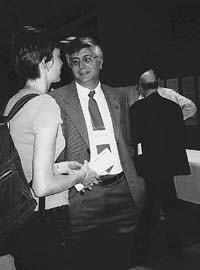
May 28, 1998 |
    |
Education fair has the last word on learning
by Linda Menard
The Centre for the Study of Learning and Performance (CSLP) displayed a wealth of intriguing ideas and projects on May 5 at a research fair in the atrium of the J.W. McConnell Building. It included 30 posters (text and illustration to summarize a research project) and nearly a dozen video and software demonstrations by CSLP researchers and graduate students.
The CSLP received a $90,000 grant last fall to bring together researchers in Education, Psychology, and Teaching English as a Second Language (TESL) to address the enhancement of learning and performance of complex cognitive skills in learners of all ages.
"It was seed money toward becoming a Centre of Excellence," said Research Coordinator Anne Wade. "We are trying to put things into place so we can apply to FCAR for centre infrastructure funding. We hope this will happen in the next year or so."
The money has been used to support the research fair, dissemination of research, communications, outside speakers, and technical and administrative support.
CSLP Director Philip Abrami is just coming off a sabbatical in which he pursued his research on the effective integration of technology in the classroom. He is also collaborating on a textbook and multi-media project of statistics for the social sciences, which will be published in 1999 by Allen and Bacon.
Education graduate student Scott Morrison demonstrated the Success For All program for beginners. "One-to-one tutoring is the most effective form of instruction we know of," he explained. "However, it is also the most expensive."
In Success for All, computer-aided tutoring software (called Reading CAT) monitors the program by pulling together information about the student's progress, keeping it in the database, and making it available to the tutor, teacher and program facilitator.
Psychology Professor Norman Segalowitz is a CSLP researcher and Director of the Leonardo Project, which focuses in particular on second-language skills and expert musical performance. Posters presented by him and his researchers explored the development of high-level attention-management skills.
The Leonardo Project, a collaborative effort by Psychology and Music researchers, investigates how to maximize human potential in music performance.
The research requires unconventional methods, doctoral student Angela Chan acknowledged. "The number of keystrokes [in a piano piece] are easily quantified, but counting them might miss the creative elements we are trying to investigate. Humans are dynamic. We are exploring musicians' ability to adapt to a changing environment."
"Concept-mapping" is a way of drawing a diagram of thought processes and how ideas succeed one another in learning. Adjunct Professor Christina DeSimone said that concept-mapping can be used across the Internet to share material or get feedback from your teacher, and could also be applied to cross-cultural studies.
Other participants in the research fair displayed the CSLP's progress in computer-assisted learning for the disabled, teaching French or English as a second language, and training teachers to integrate technology into the classroom.

Professor Philip Abrami talks to a student at the Education fair.